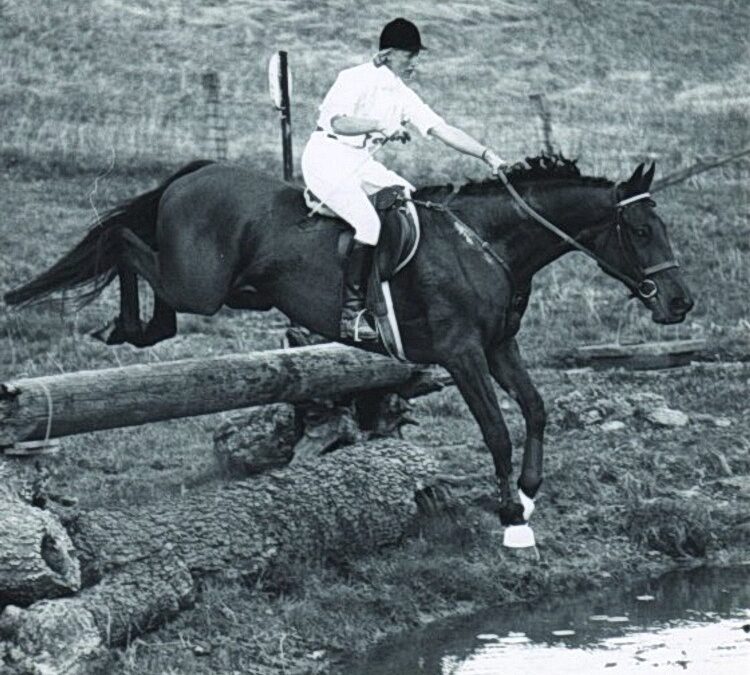
by Nancy Jaffer | Apr 29, 2025
Lana duPont Wright, who made history as the first female eventer to ride in the Olympics, died at her home in Chesapeake City, Md., last week. She was 85.
Olympic eventing, which had been contested by U.S. military teams through 1948, was still limited to male participants until 1964. That was when Lana, who grew up in a foxhunting family, became part of the U.S. silver medal squad at the Tokyo Games. Demonstrating her grit and determination, she continued on the demanding cross-country course despite having two falls. (In those days, you were allowed to remount and continue after hitting the ground.)
“It was quite an honor to have been part of such a successful team,” she recounted, “particularly since it opened the avenues for many other woman participants in the Olympic three-day event thereafter.”
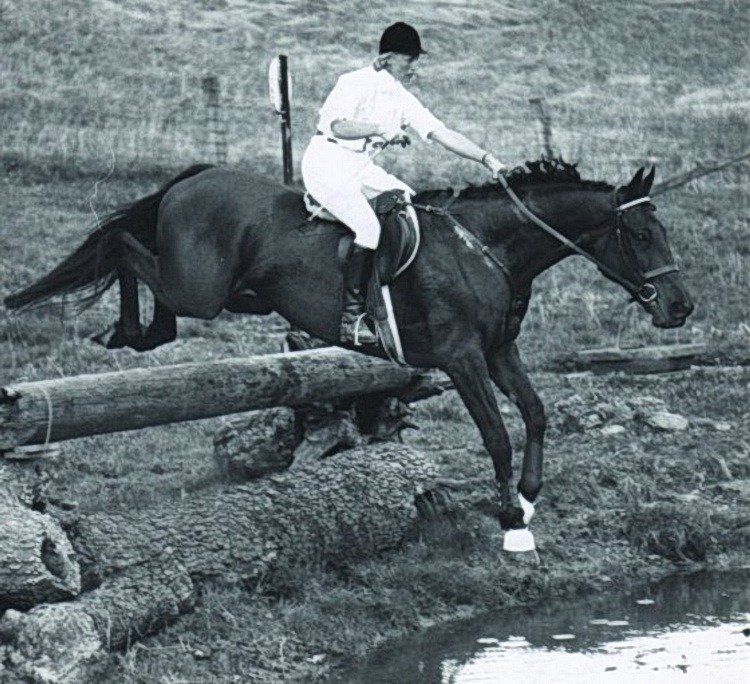
Lana duPont Wright in her eventing days.
When Lana switched disciplines, she went on to earn another historic medal as part of the 1991 U.S. pairs driving team, the first to take gold at a world championships.But her riding career wasn’t over. She competed in endurance and rode in the Pan American Endurance Championships. The endurance aspect was one Lana was passionate about in both eventing and driving, so it was a natural progression. She also continued foxhunting, which was the sport that gave her the basics of her career in her youth.
In 2012, she was inducted into the U.S. Eventing Association Hall of Fame. Three years later, she received the U. S. Equestrian Federation’s Lifetime Achievement Award.
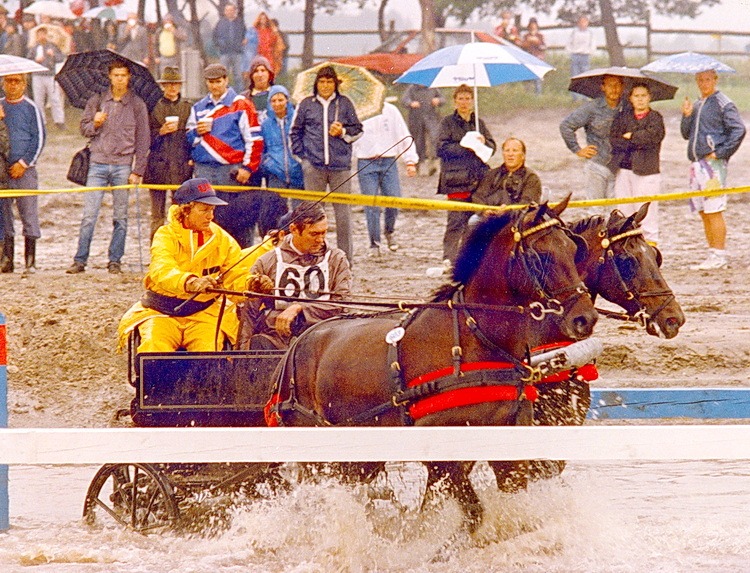
Lana Wright competing in the marathon at Fair Hill in 2013. Photo © 2013 by Nancy Jaffer
Lana shared her love of horses and knowledge with young riders through the U.S. Pony Club. She also served as co-president of the Fair Hill International board (along with the late Trish Gilbert) in Maryland for decades.
She is survived by her daughter Lucy Dunne (Michael) of Vermont and her grandchildren Wright Morris,, Beale Dunne and Ridgely Dunne. She was predeceased by her parents, Richard and Allaire duPont; her brother, Richard duPont Jr, her husband, Dr. William Wright and daughter Beale Morris.
A celebration of Lana’s life will be held Thursday, May 1 at 11 a.m. at St. Augustine Church, 310 and Mitton Road, Chesapeake City, MD. The burial will be held privately. In lieu of flowers, contributions may be made to Fair Hill International Inc., and sent in care of R.T. Foard Funeral Home, P.A., P.O. Box 248 Rising Sun, MD 21911.
by Nancy Jaffer | Apr 23, 2025
The U.S. Center for SafeSport has fired CEO Ju’Riese Colón in the wake of an investigation by U.S. Sen Chuck Grassley (R-Iowa) into the organization’s hiring of an investigator who subsequently was charged with rape.
The CEO, who was let go on Tuesday, assumed her role in 2019 to run the center created to combat sex abuse in Olympic sports. SafeSport became the target of criticism on several fronts, including delays in processing its caseload and what some of the accused called a lack of due process in the way its business was handled.
The tipping point came after former Allentown, Pa., vice squad officer Jason Krasley was hired by SafeSport in 2021, but fired in November 2023 when it was revealed he had been arrested for allegedly stealing money from a drug bust. Two weeks later, Krasley was arrested on charges involving rape, sex trafficking and other crimes. The Center went on to make changes in its hiring process.
The Center was founded eight years ago, when the Olympic movement was faced with abuse issues in several sports The most headlines were generated by the scandal at USA Gymnastics, where team doctor Larry Nassar eventually wound up in prison after being accused of sexually assaulting hundreds of female athletes under the guise of medical treatment.
Steve Silvey, an attorney who represents Athletes for Equity in Sport, commented about the SafeSport leadership change, “It gives little satisfaction to see the titular head of an organization fired as some sort of public sacrifice. Similar to firing a coach for a dysfunctional team’s performance. We have commented for many years that the entire SafeSport organization is an abject failure for all concerned: victims, the sporting community, the NGBs (National Governing Bodies) and the USOPC (U.S. Olympic and Paralympic Committee.)
He added, “SafeSport is lost, it may be too late to fix it and it is probably irretrievable. However, if the organization is genuinely interested in getting on track with the intended mission and finding its way to a proper path, then it is a good start but a complete spring cleaning and total reset is required.
“The Board needs to be reset, and the rest of any dysfunctional existing leadership should follow out the door. Now is both the time and opportunity for a major correction. Otherwise — it just smacks of a coach being sacrificed as strategic posturing and the root problems remain unaddressed. It also does nothing to correct the lives damaged or even destroyed by the root dysfunction. I suppose we’ll see, but we’re not holding our breath either.”
The U.S. Equestrian Federation requires competing members 18 and older to complete SafeSport training on line, along with officials and show managers. USEF has a 24-page document outlining SafeSport policy on its website.
SafeSport board chairperson April Holmes will lead board members in a management committee while they search for a new CEO.
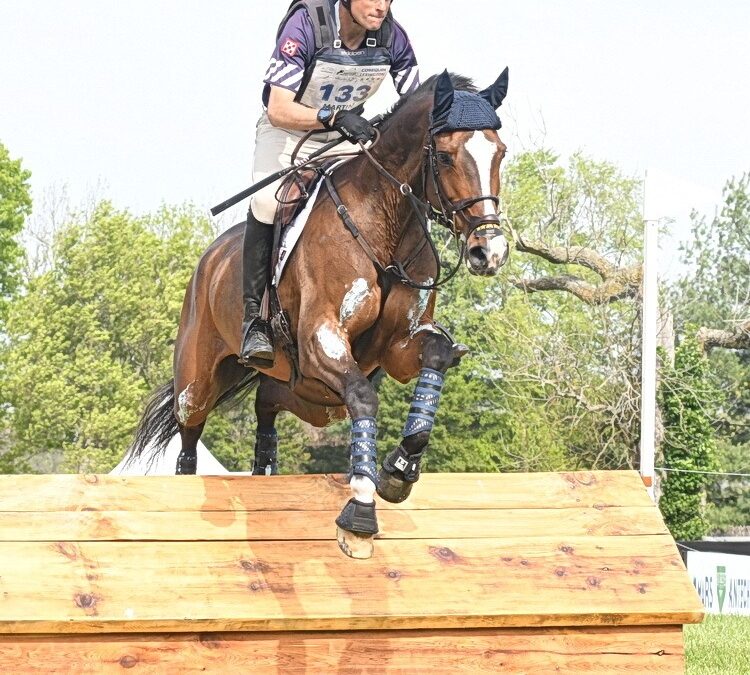
by Nancy Jaffer | May 2, 2025
While he is the most visible U.S. eventer with a huge social media presence, Boyd Martin was only number two on the FEI world ranking list. That is, until Thursday. With the new month, he becomes the first American to make the top spot on that roster since Kim Severson did it 21 years ago.
Boyd, with three horses in the top 10 of last weekend’s 5-star Defender Kentucky event, called his elevation, “a huge honor and privilege to be named the number one rider in the world in eventing. It’s a goal I’ve been chasing for decades now. Many of my idols, who are champions in the sport and riders I’ve always tried to emulate, have accomplished this honor at some point in their careers.”
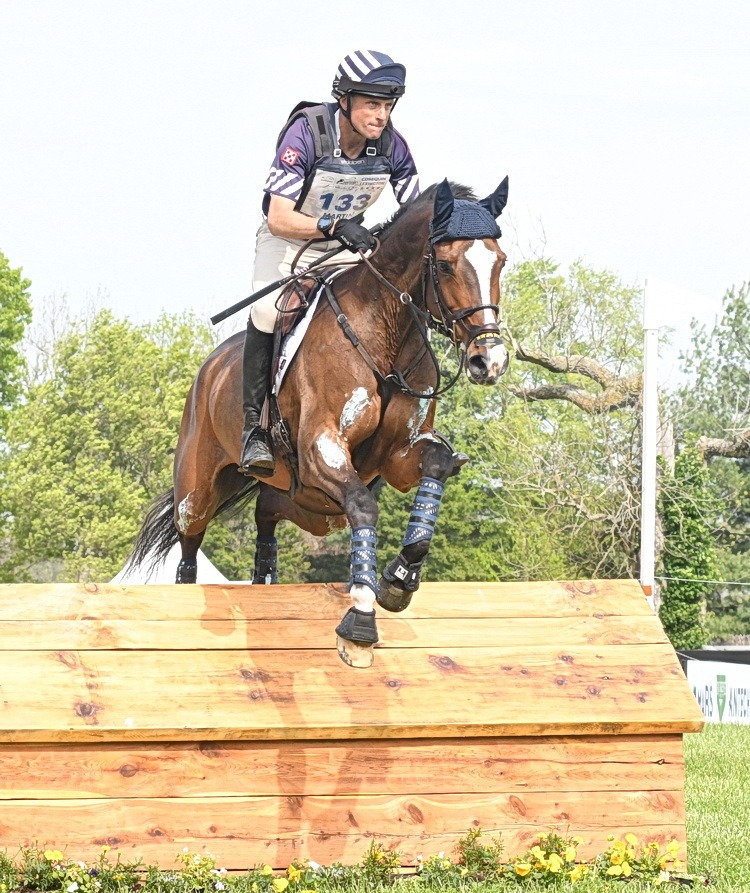
You can’t miss the trademark look of determination on the face of Boyd Martin aboard Commando 3. (Photo © by Nancy Jaffer)
Boyd added, “It’s really a humbling moment, and even though it’s my name on the list, I would not have been able to do it without the incredible horses and owners, as well as my dedicated team working day in and out in the stable. Lastly, to share this with my wife and kids, who have been with me on this journey every single day from the very beginning, is really special.”
While Boyd’s promotion is good news for U.S. eventing, the bad news is that you have to go down to number 30 to find the next-highest ranked U.S. rider, Jennie Branningan. Since one person does not make a team, U.S. eventers have some hard work ahead of them. But now they have some inspiration.
by Nancy Jaffer | Apr 22, 2025
Stating that “the integrity of our sport is in danger,” U.S. Hunter Jumper Association President Britt McCormick warned during his organization’s online Town Hall Monday that there must be “zero tolerance for people that use illegal medication on horses.”
Britt, who had spoken on the topic during both the USHJA and U.S. Equestrian Federation annual meetings, was responding to a comment during the Town Hall made by Lynn Walsh, former president of the Pin Oak Charity Horse Show in Texas. Her concerns involved the overuse of medications.
The USEF in January passed an addition to the prohibited substances rule that banned from all showgrounds a list of certain injectable substances and those that are potentially deadly. The rule, which went into effect April 1, included formaldehyde and liquid nitrogen, as well as injectable pentobarbital, unless a veterinarian needs it to euthanize a horse. Rectal administration of any substance also is prohibited on the grounds of a licensed show.
Speaking about the medication issue, Britt said, “Those of us as horsemen, we have to stop this. It’s disgusting, there’s no other word for it. I think this is one of those ‘See something, say something’ -type situations. We have to be willing to stand up to our fellow competitors and say ‘Enough is enough.’
“It doesn’t matter who you are. It can be at the lowest level, it can be at the highest level. The integrity of our sport is in danger. The ability of us to compete these animals is in danger,” he pointed out.
With Social License to Operate focusing on the horse industry, the sport is under ever-increasing public scrutiny, elevated by the pervasive presence of social media.
“If we allow even one bad actor out there to use prohibited substances, we could all be in danger of losing our livelihood, losing our industry, losing our sport,” Britt emphasized.
“It’s more than just the USEF coming down on somebody and imposing a lifetime sentence. It’s more than a multiple of thousands of dollars in fines. It starts with us.”
He maintained, “Peer pressure is going to work,” suggesting that those who see something wrong should call out the perpetrator.
“The rest of us are going to back you up,” emphasized Britt, a Texas-based trainer who is also a judge.
“I for one am not going to tolerate it. As the head of this organization, I’m going to be the first one to stand up and say, `If you get caught using some of these substances, you should be banned from our sport forever, we don’t want you in it.”
He added, “until all of us are serious about it, it’s never going to get better, and it’s never going to stop. We can have all the discussion about judging and everything else. Until we take care of this root evil that’s invading our sport, the rest of this doesn’t matter.
“I think we as horse people, horse lovers, enthusiasts, sports people…we all want fairness, we all want a level playing field. We have to have zero tolerance when it comes to these medications. Going forward, again; ‘see somethings say something’ is the only way. That goes for the vets, it goes for the pharmacists, it goes for everybody.
“A trainer has to get a medication from a vet, who has to make the prescription and a pharmacy has to fill it. There’s a lot of hands touching this stuff. Until we get serious about it. It’s never going to end.”
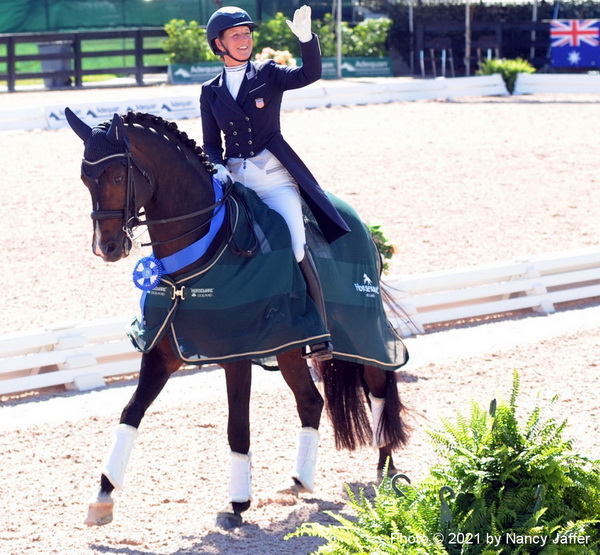
by Nancy Jaffer | Apr 6, 2025
Sabine Schut-Kery, who clinched a silver medal for the U.S. dressage team at the Tokyo Olympics, will be offering a clinic May 9-11 to benefit Dressage at Devon in Pennsylvania as it prepares to mark its fiftieth anniversary. And at Dressage at Devon itself on Sept. 25, Germany’s Ingrid Klimke will give a masterclass. Ingrid, daughter of the legendary Olympic dressage multi gold medalist Reiner Klimke, is both a gold medal eventer and top dressage rider.
Auditors are welcome to attend the clinic at Dunmovin Farm in Pennsylvania and learn from Sabine, who gave a Masterclass at Dressage at Devon in 2022. She is known for her understanding of classical dressage principles combined with modern training techniques. From developing young horses to competing on the world stage, her expertise spans all levels of the sport. Her horsemanship, keen eye for detail and inspirational teaching style make her a sought-after clinician worldwide.

Sabine Schut-Kery and her Olympic mount Sanceo. (Photo © 2021 by Nancy Jaffer)
“Dressage at Devon holds a special place in my heart,” she said. “I look forward to sharing my foundational principles with riders and spectators in May while working with a diverse range of horse-and-rider combinations.”
Aspiring amateurs, seasoned professionals and fans are all welcome at the clinic. Sabine’s commentary and ability to break down complex concepts will provide a deeper understanding of biomechanics, harmony and precision in training, whether those who come to Dunmovin are riding or watching.
Ann Moss, president of Dressage at Devon, emphasized the significance of this event.
“Sabine has long been a beloved favorite at Dressage at Devon, captivating audiences with her performances even before her Olympic success. After hosting our inaugural Masterclass in 2022, we are thrilled to welcome her back this spring. This clinic not only upholds our commitment to education but also supports our iconic fall show.”
Riders and horse owners will have a chance to interact directly with Sabine at a private dinner hosted by Christina Morin-Graham at Oak Springs Farm in Malvern, Pa. Proceeds from this clinic will directly support Dressage at Devon’s continued success and impact within the equestrian community.
For more details on Sabine’s clinic, visit dunmovin.net/clinic. For clinic information, contact Doreen Garland at (610) 416-3839 or Dunmovinenterprisesllc@gmail.com. For more information on the Ingrid Klimke masterclass, click on this link.
Celebrating its 50th anniversary September 23-28, 2025, at the Devon Horse Show Grounds in Devon, Pennsylvania, Dressage at Devon (DaD) has been a prestigious tradition since 1975. It attracts top competitors, trainers and judges from across North America and beyond, making it one of the most respected international dressage competitions.
Dressage at Devon is a 501(c)(3) nonprofit organization with a mission centered on education and excellence in the sport of dressage.For corporate sponsorship opportunities, contact Lisa Engel at 908-310-6248.
by Nancy Jaffer | Apr 22, 2025
Noted breeder Dr. Timothy Holekamp, a former president of the American Trakehner Association, died on Sunday.
He was a founder of the Young Event Horse Program and co-chaired the Young Event Horse Committee.
The physician and his wife, Cheryl, were the owners of Windfall II, who started his career with Germany’s Ingrid Klimke and went on to earn teem bronze at the 2004 Athens Olympics with the USA’s Darren Chiacchia aboard. Windfall became a popular sire. His son, Tsetserleg TSF, was ridden to many successes by U.S. team member Boyd Martin.
Remembering Dr. Holekamp, Boyd said on social media, “He was always my go to man whenever I was trying to get an understanding of a pedigree and was a wealth of knowledge that really inspired a lot of American enthusiasts to breed Trakehner horses.”









